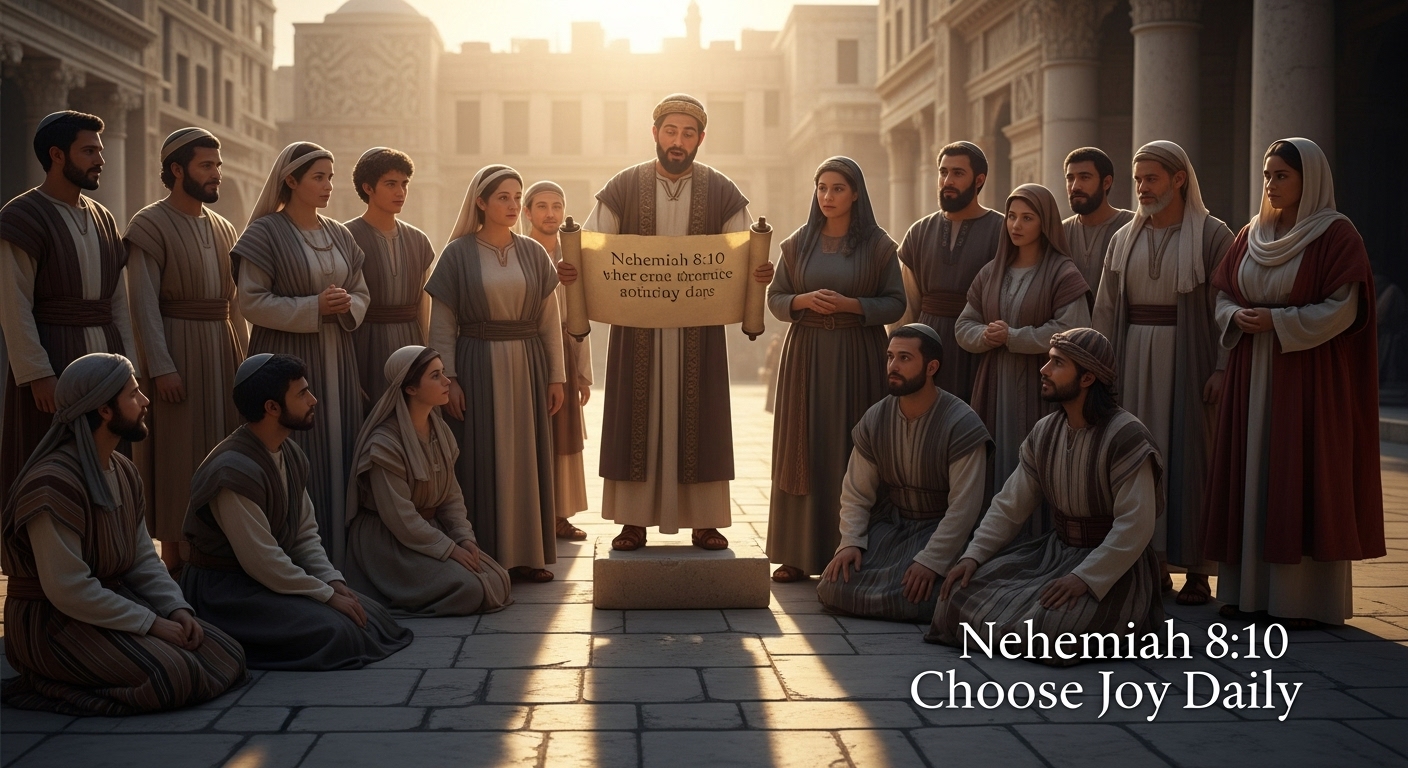Choosing Joy Daily — Lessons From Nehemiah 8:10

Introduction
Have you ever noticed how life hands you reasons to feel discouraged, and yet a quiet invitation to joy keeps showing up? Maybe your day started with an email that drained you, a phone call with bad news, or the same old worry you can’t shake. Still, somewhere inside you sense that joy is possible — not as denial, but as a choice that changes how you live. In Nehemiah 8:10, you find a short, powerful instruction: do not grieve, because “the joy of the Lord is your strength.” That’s not just ancient poetry. It’s a daily invitation for you to choose joy even when circumstances tempt you to give in to fear or sorrow.
This article walks you through the verse, uncovers its context and deeper meaning, and gives practical steps so you can choose joy daily. You’ll get simple, real-life applications that help joy move from idea to habit in your life.
The Bible Foundation
Read Nehemiah 8:10 here: Nehemiah 8:10 (NIV)
Nehemiah 8:10 (NIV): “Nehemiah said, ‘Go and enjoy choice food and sweet drinks, and send some to those who have nothing prepared. This day is holy to our Lord. Do not grieve, for the joy of the LORD is your strength.’”

To understand this verse, picture the scene: the returned exiles have rebuilt Jerusalem’s walls, and now the people gather to hear the Law read aloud. When they hear God’s words, many realize how far they’ve drifted and begin to weep. Nehemiah, Ezra, and the leaders see their grief and call for a different response: celebrate instead. They tell the people to feast and share, to treat this day as holy, and to accept joy — not for escapism but as spiritual strength for the journey ahead.
This moment is anchored in restoration. The Law’s reading reveals God’s standards and His promises; the people’s tears show repentance. The leaders’ instruction points you beyond shame and toward renewed life. Joy here is communal, sacramental, and rooted in God’s presence.
Understanding the Core Truth
At its heart, Nehemiah 8:10 teaches one main idea: joy is not optional for the follower of God; it’s a source of strength. The phrase “joy of the LORD” means that your joy is connected to God’s character and presence. It’s not merely a feeling you manufacture; it’s a gift and a discipline anchored in who God is and what He has done.
This truth matters because life will always include hard seasons, but those seasons don’t get the final say about your inner life. When you understand joy as belonging to the Lord, you stop chasing temporary pleasures and start leaning into a spiritual resource that sustains you. Joy becomes a posture: you mourn when needed, but you don’t stay there. You allow God’s truth to reframe your pain and turn it into motivation and hope.
Going Deeper — The Hidden Meaning

Beyond the surface, Nehemiah 8:10 invites you to a deeper theological reality: joy and repentance belong together. The people wept because they recognized their shortcomings; then they were told to celebrate. That sequence means grief and joy are part of a spiritual cycle — repentance leads you closer to God, and that proximity produces joy. Joy in this passage is also communal: leaders encourage sharing food and giving to those without. That generosity anchors joy in compassion.
Think of the story of Ruth and Naomi: Naomi’s bitterness turned into joy through relationship and God’s providence. Or consider Paul’s words in Philippians, where he writes about rejoicing amid hardship because Christ’s presence reorients the heart. Joy isn’t the absence of trouble; it’s the presence of God in trouble, the steadying power that helps you endure and act.
When you connect repentance, community, and God’s presence, joy becomes both an outcome and a weapon. It fights despair, fuels resilience, and compels you to give to others. That’s the “hidden” strength: joy doesn’t just feel good; it makes you strong in practical, spiritual ways.
Modern Connection — Relevance Today
How does this ancient verse speak into your modern life? Very directly. You live in a culture of comparison, quick fixes, and emotional instability. It’s easy to let external circumstances dictate your inner climate. Nehemiah’s instruction flips that script. You can cultivate joy because it is tied to God’s character and not your latest success or failure.
In families, choosing joy helps you respond with patience rather than anger. At work, it steadies you when projects fall apart or feedback stings. In personal faith struggles, joy anchors your identity so you don’t measure your worth by feelings alone. Practically, choosing joy means you take concrete steps: worship, Scripture, community, service, and gratitude — spiritual disciplines that remind you daily of God’s goodness.
When you choose the “Joy of the Lord,” you also become a conduit of that joy. People notice calmness, generosity, and hope. Your joy strengthens others the same way it strengthens you. In a world desperate for hope, your divinely rooted joy is contagious and transformative.
Practical Application — Living the Message

Turning this teaching into daily practice doesn’t require grand gestures. It starts with small, consistent habits that align your heart with God’s joy.
- Start your day with a short Psalm or Scripture that reminds you of God’s goodness. Even one verse can reset your tone.
- Choose one act of generosity weekly — share a meal, call someone who’s lonely, or give to someone in need. Sharing increases joy.
- Practice gratitude by naming three things before bed that revealed God’s kindness that day.
- When grief comes, acknowledge it honestly, then invite God into it. Pray: “Lord, I see my pain; help me trust you here.” Allow the community to mourn with you.
- Rehearse Jesus’ promises when anxiety spikes. Repetition builds neural pathways that help joy become your first response rather than your last resort.
These steps are simple but powerful. Over time, they train you to choose joy daily, not as denial of hardship but as an intentional, faithful stance rooted in God.
Faith Reflection Box
Take a moment and ask yourself: Where am I allowing circumstances to write my emotional story instead of letting the “Joy of the Lord” shape it?
Reflect on a recent hard moment. What would change if you responded first with prayer, then with an act of kindness or gratitude? How might that shift your experience and your witness to others?
Key Takeaways:
- Joy of the Lord is your strength — not a feeling, but a spiritual resource you can access.
- Joy and repentance belong together; sorrow can lead you back to life.
- Choosing joy daily looks like small, faithful practices: Scripture, prayer, generosity, and gratitude.
- Your joy sustains you and becomes a gift to others.
Q&A
Q1: Can you still choose joy when you’re grieving a deep loss?
Answer: Yes. Choosing joy in deep grief doesn’t erase your pain or rush your mourning; it invites God’s presence into your sorrow so He can strengthen you. Nehemiah shows grief leading to repentance and then to celebration — a rhythm that honors both pain and hope. When grief is raw, choose small steps: invite a friend over, pray a single honest sentence, or read a comforting Psalm. These aren’t shortcuts; they are faithful acts that let God’s joy begin to work in you. For more on walking through grief with faith, see https://biblestorieshub.com/seeking-gods-comfort-in-times-of-grief-psalm-3418/. Also consider Psalm 34:18 for comfort.
Q2: How do I practice joy at work when everything feels overwhelming?
Answer: At work, practical joy starts with perspective and tiny choices. Begin the day by thanking God for one workable thing — your skills, a helpful colleague, or the opportunity to serve. When stress spikes, pause for a two-minute breath prayer: “Lord, be my strength.” Look for a chance to be generous — share a compliment, help a coworker, or bring a snack. These small acts reconnect you to purpose and to God’s joy. Over time, these habits rewire your responses. For more on faith at work, visit https://biblestorieshub.com/faith-that-works-love-in-action-james-217/. Scripture that encourages steady strength: Philippians 4:6-7.
Q3: How does communal joy differ from personal joy, and why does it matter?
Answer: Communal joy is shared; it multiplies and sustains people beyond what you can do alone. In Nehemiah, leaders tell the people to share food and celebrate together, turning a private relief into a public gift. When joy is communal, it builds resilience, accountability, and generosity. You’re less likely to sink into despair when others stand with you. Cultivate communal pleasure by participating in small groups, celebrating milestones with friends, and serving in the community. For ways to build joyful community, check https://biblestorieshub.com/community-as-gods-design-for-his-people/. Scripture about shared joy: Romans 12:15.
Q4: What are practical prayers or short Scriptures to remember when joy feels far away?
Answer: Short, repeatable prayers and verses anchor you when joy feels distant. Try: “Lord, fill me with your joy today,” or “Your presence is my strength.” Verses like Nehemiah 8:10 or Philippians 4:4 (“Rejoice in the Lord always”) are quick to recall and re-center your mind. Keep a small card with a verse in your wallet or phone and read it when you need to reset. For a daily habit guide, see https://biblestorieshub.com/how-to-make-bible-reading-a-daily-habit-that-lasts/. Keep Nehemiah 8:10 handy: Nehemiah 8:10.
Conclusion & Reflection
Choosing joy daily isn’t a moralistic command to smile through pain. It’s an invitation from God to let His presence reorder your inner life so you can be strong, kind, and resilient. Nehemiah 8:10 gives you a practical lens: celebrate, share, don’t grieve long, and anchor your life in the joy that comes from the Lord. When you make small choices — a verse in the morning, a generous act, an honest prayer in the afternoon — you’re practicing an ancient truth that reshapes your modern life.

Let’s close with a short prayer: Lord, thank you that your joy is not based on my circumstances but on who you are. Help me choose that joy today — to mourn when I must, to repent when I should, and to celebrate and serve as a reflection of your strength. Fill me with your peace and make my life a light of hope for others. Amen.
Explore More
For further reading and encouragement, check out these posts:
👉 7 Bible Verses About Faith in Hard Times
👉 Job’s Faith: What We Can Learn From His Trials
👉 How To Trust God When Everything Falls Apart
👉 Why God Allows Suffering – A Biblical Perspective
👉 Faith Over Fear: How To Stand Strong In Uncertain Seasons
👉 How To Encourage Someone Struggling With Their Faith
👉 5 Prayers for Strength When You’re Feeling Weak

📘 Jesus and the Woman Caught in Adultery – Grace and Mercy Over Judgement
A powerful retelling of John 8:1-11. This book brings to life the depth of forgiveness, mercy, and God’s unwavering love.
👉 Check it now on Amazon 🛒💥
🔥 “Every great message deserves a home online.” 🌍💬🏡
Don’t let your calling stay hidden. Start a Christian blog or website using Hostinger — with 99.9% uptime, a free domain, and SSL, your voice can shine for God’s glory anytime, anywhere.
💥 Begin today. 🛒 Try it RISK-FREE! ✅
✝️ “Your body is God’s temple — care for it with purpose.” 💪💖🏛️
Renew your energy and restore balance naturally. Mitolyn helps support a healthy metabolism, giving you the vitality to live out God’s calling with strength and confidence.
🔥 Unlock Your Metabolic Power! ⚡Burn More Calories & Feel Great With Mitolyn. 💪
👉 Start Today. 🚀 Check Price Now. 🛒💰
💰 As a ClickBank & Amazon Affiliate, I earn from qualifying purchases.
📖 Acknowledgment: All Bible verses referenced in this article were accessed via Bible Gateway (or Bible Hub).
🚀 Want to explore more? 👉 Dive into our new post on Why Jesus? and experience the 🔥 life-changing truth of the Gospel!








